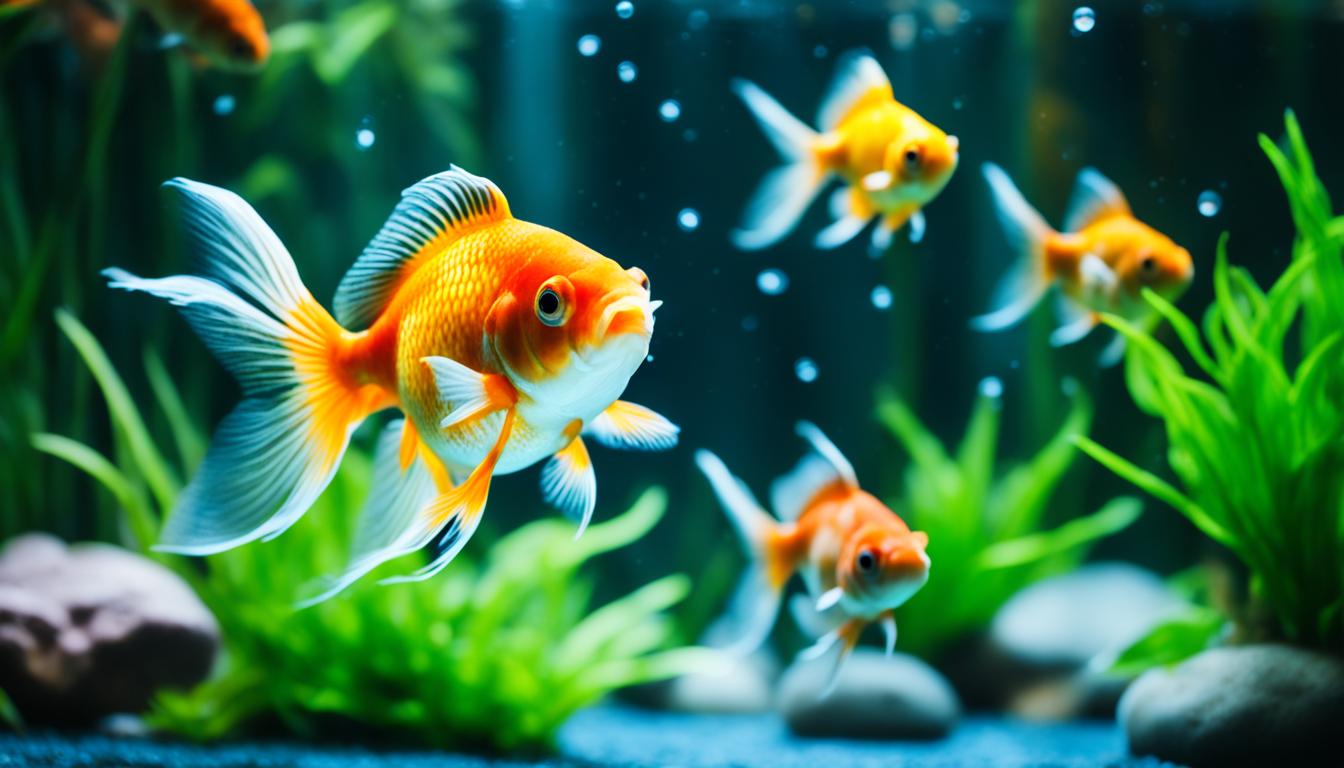Last Updated on 3 months by admin
Goldfish are beloved pets that can bring joy and beauty to any home aquarium. However, many goldfish owners face the unfortunate circumstance of their fish dying. To prevent such tragedies, it is essential to understand the common reasons behind goldfish deaths and take the necessary steps to ensure their care and well-being.
Goldfish health problems can arise due to various factors. Poor water quality, unsuitable living conditions, overfeeding, fighting with other fish, accidents or injuries, diseases, and old age are the key reasons why goldfish may perish. By addressing these issues, goldfish owners can provide their pets with a healthier and longer life.
Key Takeaways:
- Understanding the common reasons for goldfish death is crucial for their care.
- Poor water quality, unsuitable living conditions, and overfeeding can lead to goldfish health problems.
- Goldfish may suffer from diseases, injuries, and old age.
- Proper prevention measures, such as maintaining good water quality and providing a suitable environment, can help prevent goldfish deaths.
- Educating oneself about goldfish care and seeking advice from experts is essential for responsible goldfish ownership.
Unsuitable Living Conditions
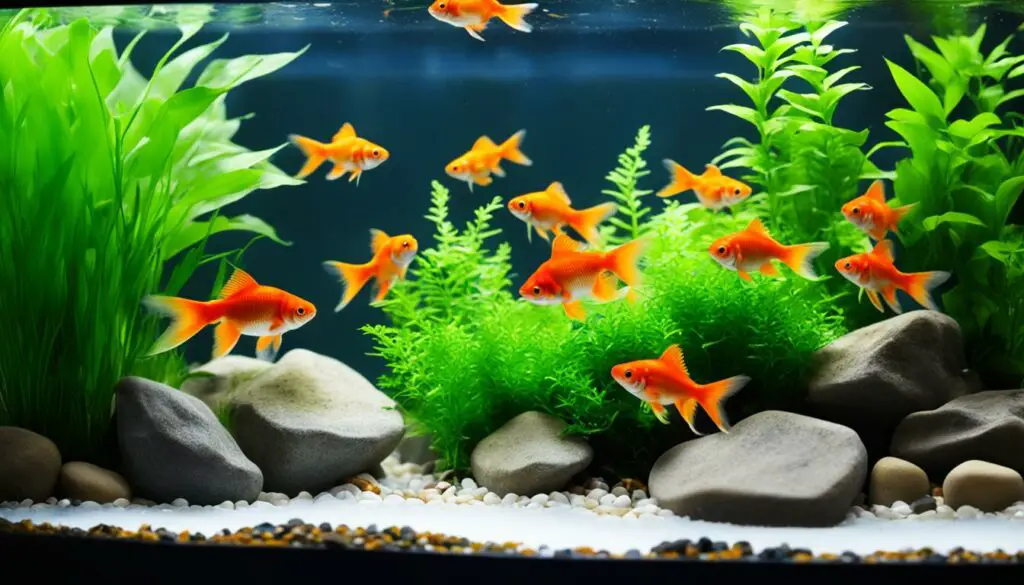
One of the main reasons goldfish die is due to unsuitable living conditions. This can include keeping the fish in a tank that is too small or not using a filter. Goldfish produce waste that can build up and create toxic conditions if not properly managed.
Maintaining good water quality is essential for the health of goldfish. Regular tank maintenance, such as cleaning the tank and performing water changes, helps to remove accumulated waste and prevent the build-up of harmful substances. Monitoring the water parameters, including temperature, pH levels, and proper oxygenation, ensures a healthy and stress-free environment for the fish.
Here are some key factors to consider for goldfish tank maintenance and ensuring optimal water quality:
- Choose an appropriate tank size based on the number and size of your goldfish. A larger tank provides more space for the fish to swim and dilutes waste more effectively.
- Use a reliable and properly sized filter to remove waste and maintain a stable environment. Make sure to regularly clean and replace filter media as needed.
- Perform regular partial water changes to remove excess waste and replenish essential minerals and elements. Aim for a water change of around 20-30% every 1-2 weeks.
- Test the water parameters regularly using a reliable water test kit. Adjust water conditions as necessary to maintain appropriate levels of pH, ammonia, nitrite, and nitrate.
A healthy and clean living environment is crucial for the well-being of goldfish, reducing the risk of stress-related illnesses and enhancing their overall longevity.
“Regular tank maintenance and proper water quality are essential for the health of goldfish.” – Expert Goldfish Keeper
To visualize the importance of unsuitable living conditions on goldfish health, refer to the table below:
| Unsuitable Living Conditions | Impact on Goldfish Health |
|---|---|
| Small tank size | Limited swimming space, increased stress, compromised health |
| Absence of a filter | Accumulation of waste, poor water quality, heightened risk of disease |
| Inadequate tank maintenance | Build-up of toxins, negative impact on overall health and well-being |
Creating a suitable living environment for your goldfish is vital for their overall health and longevity. By providing adequate tank size, using a filter, and maintaining good water quality, you can help prevent goldfish deaths and ensure a thriving aquatic habitat.
Overfeeding
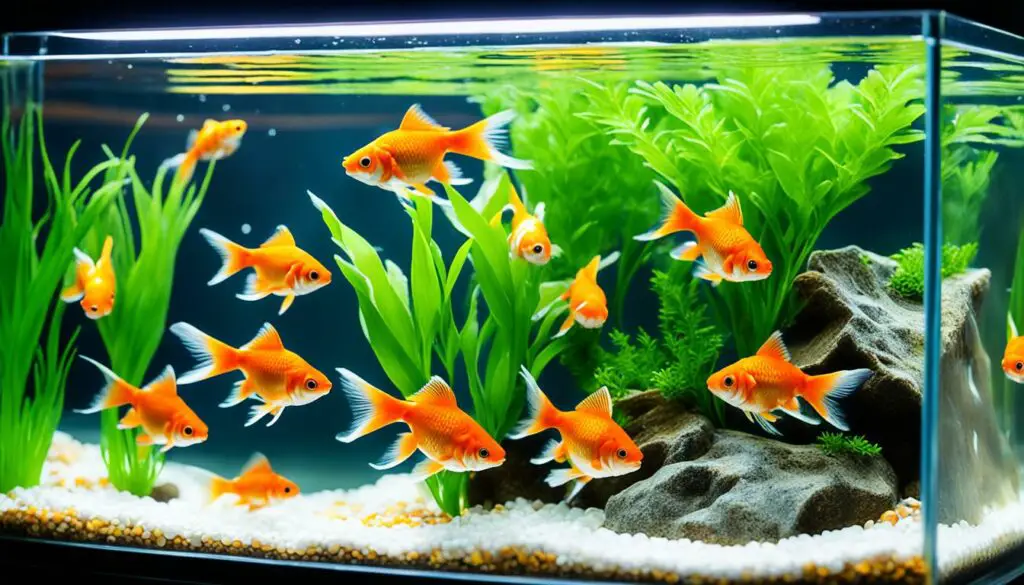
When it comes to caring for goldfish, overfeeding is a crucial factor to consider. Many goldfish owners mistakenly believe that their fish need large amounts of food to thrive. However, goldfish have small stomachs and do not require excessive amounts of food to stay healthy.
Overfeeding can have detrimental effects on goldfish health and often leads to serious consequences, including death.
When goldfish are overfed, excess food accumulates in the tank, contributing to poor water quality. This can lead to a variety of problems, such as an increase in toxic ammonia and nitrite levels. As a result, goldfish may experience stress, weakened immune systems, and digestive issues.
In particular, overfeeding can cause constipation, a common ailment in goldfish. Constipation occurs when the digestive system becomes overloaded with food, resulting in blockages and difficulty passing waste. If left untreated, constipation can lead to more severe complications, including swim bladder disease.
Proper feeding routine and portion control are essential for preventing overfeeding and its associated health problems.
Goldfish should be fed small, frequent meals throughout the day instead of a single large feeding. This helps prevent overeating and promotes proper digestion. A good rule of thumb is to feed your goldfish as much food as they can consume within 2-3 minutes, removing any uneaten portions promptly.
By following goldfish care tips and ensuring the right feeding regime, goldfish owners can help their fish avoid overfeeding-related issues and promote their overall health and well-being.
| Signs of Overfeeding | Preventive Measures |
|---|---|
| 1. Excess food floating in the tank | 1. Feed small, frequent meals throughout the day |
| 2. Cloudy or foul-smelling water | 2. Remove any uneaten food promptly |
| 3. Goldfish constantly begging for food | 3. Avoid hand-feeding or overindulging goldfish |
| 4. Goldfish becoming bloated or having difficulty swimming | 4. Provide a balanced diet and vary food types |
| 5. Increase in tank maintenance requirements | 5. Monitor water parameters regularly |
Proper goldfish care includes maintaining a clean and well-regulated tank environment, as well as ensuring a balanced and appropriate diet. By following these goldfish care tips and avoiding the common pitfall of overfeeding, goldfish owners can provide their beloved fish with the best chance of a long and vibrant life.
Fighting with Other Fish
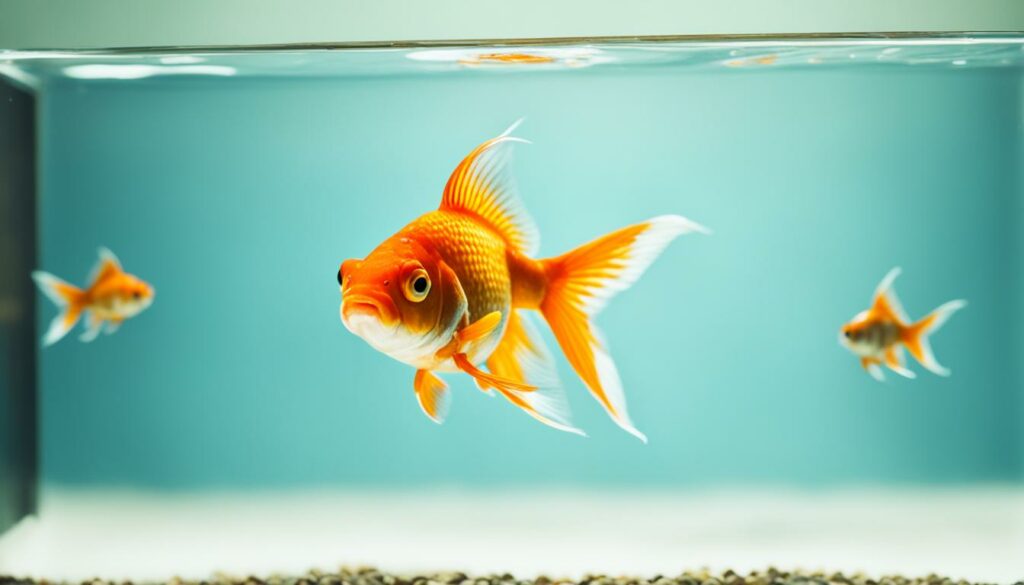
Goldfish, like many other fish species, can be aggressive and territorial. When goldfish are kept with incompatible tank mates, they may experience stress and physical injuries from fighting. This stress weakens their immune system, making them more susceptible to illnesses and ultimately resulting in death. It is important to choose suitable tank mates for goldfish and to monitor their behavior to prevent stress and aggressive behavior.
Choosing Compatible Tank Mates
When selecting tank mates for goldfish, it is important to consider their compatibility in terms of size, temperament, and water requirements. Certain fish species, such as tetras or cichlids, may be too small or aggressive to coexist peacefully with goldfish. Opt for peaceful and docile fish that can tolerate the same water conditions as goldfish. Doing research and consulting with knowledgeable aquarium experts can help ensure that you choose the right tank mates for your goldfish.
Creating a Peaceful Environment
To minimize the risk of fights and stress among tank mates, provide ample hiding places and territories within the aquarium. Decorations like rocks, plants, and caves can offer refuge and create boundaries, reducing potential aggression and competition for resources. Additionally, ensure that the tank is sufficiently spacious to accommodate all the fish comfortably. Overcrowding can exacerbate territorial disputes and increase stress levels among goldfish.
Monitoring Behavior and Making Adjustments
Regularly observe the behavior of your goldfish and their tank mates. Look for signs of aggression, such as chasing, nipping, or fin damage. If you notice any aggressive behavior or stress-related symptoms, consider separating the problematic fish from the others or rehoming it to a more suitable environment. Providing a calm and harmonious tank environment is essential for the health and well-being of your goldfish.
“Choosing compatible tank mates for your goldfish is crucial for their overall well-being. By ensuring peaceful coexistence and minimizing stress, you can help prevent fights and protect your goldfish from potential illnesses and premature death.”
Overall, creating a compatible and stress-free environment for goldfish can significantly reduce the risk of fights and ensure their longevity. Choose tank mates wisely, provide adequate hiding places, and monitor their behavior closely to prevent stress-related complications. By promoting a peaceful community within the aquarium, you can enjoy the beauty and companionship of your goldfish for years to come.
Accidents or Injuries
Accidents and injuries can also lead to the death of a goldfish. Goldfish may jump out of the tank, get stuck in decorations, or become trapped in filters. It is important to provide a safe and appropriate habitat for goldfish to prevent these accidents. Regular goldfish tank maintenance, including removing sharp objects and providing proper hiding spots, can help reduce the risk of injuries.
| Accidents or Injuries | Risk Factor | Preventive Measures |
|---|---|---|
| Goldfish jumping out of the tank | High risk | Ensure a secure tank lid or cover |
| Goldfish getting stuck in decorations | Moderate risk | Choose decorations without small openings or sharp edges |
| Goldfish becoming trapped in filters | High risk | Use a filter guard or sponge to prevent entrapment |
Proper precautions should be taken to eliminate hazards that may cause accidents or injuries to goldfish. By providing a safe environment and practicing regular maintenance, goldfish owners can ensure the well-being and longevity of their beloved pets.
Diseases
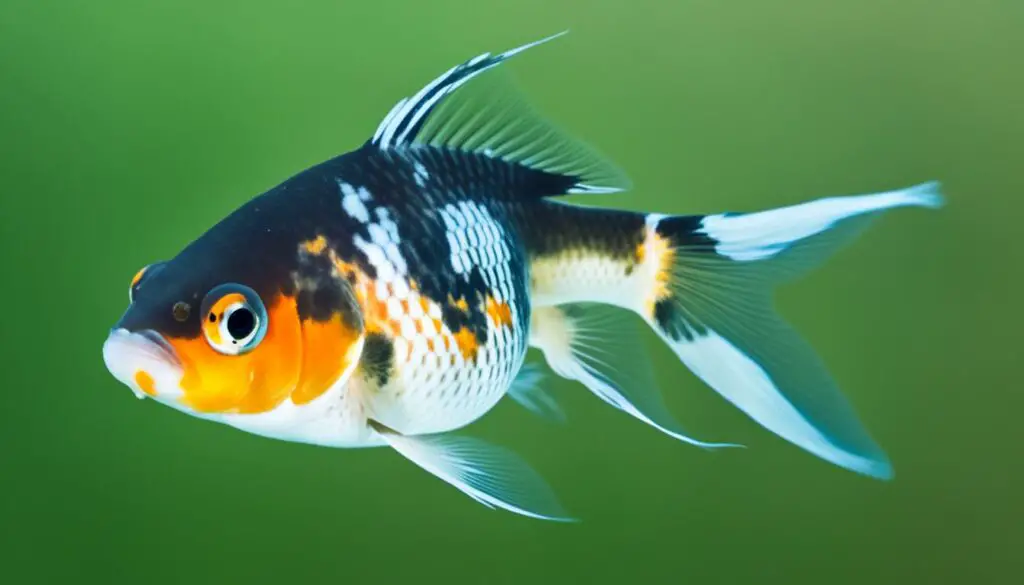
Diseases are a common cause of goldfish deaths. Goldfish can be affected by various infections and illnesses, such as bacterial or fungal infections, parasites, and viral diseases. Recognizing the symptoms of these diseases, such as changes in behavior, physical abnormalities, or abnormal poop, is crucial for early detection and treatment.
Quarantining new fish, maintaining good water quality, and practicing proper hygiene can help prevent the spread of diseases and minimize the risk of goldfish deaths.
Common Goldfish Disease Symptoms:
- Changes in behavior, such as lethargy or loss of appetite
- Physical abnormalities, like lesions or fin rot
- Abnormal poop, including stringy or discolored feces
- Erratic swimming patterns or difficulty staying upright
By staying vigilant and regularly observing your goldfish for any signs of illness, you can take prompt action to address potential disease outbreaks.
Goldfish Parasite Control:
Parasites can be a common threat to the health of goldfish. External parasites like ich (white spots), anchor worms, and fish lice can cause discomfort and potential harm to the fish. Internal parasites, such as intestinal worms, can also impact their overall well-being.
To control parasites in goldfish, it is important to:
- Quarantine new fish before introducing them to the main tank to prevent the spread of parasites.
- Maintain good water quality and cleanliness in the tank, as poor water conditions can stress goldfish and make them more vulnerable to parasites.
- Follow appropriate medication and treatment protocols recommended by a knowledgeable veterinarian or fish expert.
Regular monitoring, appropriate preventive measures, and immediate treatment can help keep goldfish healthy and free from parasites.
Old Age
Goldfish, like any living creature, have a long lifespan and will eventually reach old age. With proper care, goldfish can live for many years, but it’s important to understand that age-related complications can occur, leading to their natural death.
Providing appropriate care and understanding the expected lifespan of goldfish can help prolong their lives and ensure they have a peaceful end. Here are some essential goldfish care tips to keep in mind:
- Provide a spacious tank or pond with plenty of swimming space for your goldfish as they age.
- Monitor and maintain good water quality, as clean and well-oxygenated water is vital for their health.
- Feed your goldfish a balanced diet to meet their nutritional needs, adjusting the amount and frequency of feeding as they grow older.
- Observe their behavior and physical condition regularly to detect any signs of illness or discomfort.
As your goldfish reaches old age, it’s crucial to offer them a comfortable and stress-free environment. Consider adding hiding spots and plants in the tank to provide them with a sense of security. Remember to handle older goldfish with care and avoid sudden movements or loud noises that may startle them.
How to Dispose of Dead Goldfish
When a goldfish dies, it is important to dispose of it properly. Flushing a dead goldfish down the toilet is not recommended as it can pollute the water and spread diseases. There are several options for disposing of a dead goldfish:
- Removing it from the tank: Carefully take the deceased goldfish out of the tank using a net or scoop. This method allows for a simple and immediate removal.
- Burying it in a designated area: Choose a suitable spot in your backyard or garden and dig a small hole. Place the goldfish in the hole and cover it with soil. This method offers a respectful way to say goodbye to your cherished companion.
- Throwing it away in a sealed bag: Place the dead goldfish in a small plastic bag, seal it securely, and dispose of it in your regular household waste. This option provides convenience and containment.
- Cremation: If you prefer a more personalized and symbolic farewell, you can opt for goldfish cremation services provided by some pet crematories. This allows for a dignified end and the opportunity to keep the ashes as a memorial.
Each option has its own considerations, and the choice should be based on your personal preferences and local regulations. Handling a deceased goldfish with care and respect is an important aspect of responsible pet ownership.
How to Keep Goldfish Alive
To prevent goldfish from dying, it is important to provide them with proper care. By following these goldfish care tips and implementing proper goldfish care and tank maintenance practices, you can help ensure the health and longevity of your fish.
- Maintain Good Water Quality: Regularly test the water parameters of your goldfish tank and make necessary adjustments to ensure optimal conditions. Perform regular water changes to remove toxins and maintain a clean and healthy environment for your goldfish.
- Provide a Suitable Tank Size and Environment: Goldfish require ample swimming space. Make sure your tank is large enough to accommodate the size and number of goldfish you have. Include suitable tank decorations, plants, and hiding spots to create a stimulating and comfortable environment.
- Follow a Balanced Feeding Routine: Overfeeding can lead to health problems in goldfish. Feed them a balanced diet of high-quality goldfish food in appropriate quantities. Monitor their feeding habits and adjust accordingly.
- Monitor for Signs of Illness: Regularly observe your goldfish for any unusual behavior, physical abnormalities, or signs of illness. Early detection and prompt treatment can prevent conditions from worsening.
Additionally, practicing proper goldfish tank maintenance is crucial for their well-being. Perform regular cleaning of the tank, including removing debris and waste, and ensure proper filtration to maintain optimal water quality. Seeking advice from experts and educating yourself about goldfish care can further enhance the success of keeping your goldfish alive and thriving.
| Care Tips | Proper Goldfish Care | Goldfish Tank Maintenance |
|---|---|---|
| 1. Maintain good water quality | 1. Provide a suitable tank size and environment | 1. Regular tank cleaning |
| 2. Follow a balanced feeding routine | 2. Monitor for signs of illness | 2. Proper filtration |
Conclusion
Goldfish deaths can be prevented by addressing the common reasons behind their demise. By providing suitable living conditions, maintaining good water quality, avoiding overfeeding, preventing fights with tank mates, preventing accidents and injuries, monitoring for diseases, and understanding the natural aging process, goldfish owners can ensure the health and longevity of their fish.
Proper disposal of dead goldfish and continuous efforts to educate oneself about goldfish care are also important aspects of responsible goldfish ownership. With the right knowledge and care, goldfish can thrive and bring joy for many years.
FAQ
Why do goldfish die?
Goldfish can die due to various reasons, including poor water quality, unsuitable living conditions, overfeeding, fighting with other fish, accidents or injuries, diseases, and old age.
What are some common reasons for goldfish death?
Common reasons for goldfish death include unsuitable living conditions, overfeeding, fighting with other fish, accidents or injuries, diseases, and old age.
How can I prevent goldfish from dying?
To prevent goldfish from dying, you can provide suitable living conditions, maintain good water quality, avoid overfeeding, prevent fights with other fish, prevent accidents and injuries, monitor for diseases, and understand the natural aging process.
What are the symptoms of goldfish diseases?
Symptoms of goldfish diseases can include changes in behavior, physical abnormalities, and abnormal poop.
What should I consider for goldfish tank maintenance?
Goldfish tank maintenance includes regularly cleaning the tank, performing water changes, monitoring water parameters, ensuring proper filtration, and removing sharp objects.
How can I prevent stress in goldfish?
To prevent stress in goldfish, you can provide a suitable tank environment, choose compatible tank mates, and monitor their behavior.
How much should I feed my goldfish?
Goldfish have small stomachs and do not require large amounts of food. It is important to follow a balanced feeding routine and provide the appropriate amount of food for your goldfish.
What should I do if my goldfish dies?
When a goldfish dies, it is important to dispose of it properly. Options include removing it from the tank, burying it in a designated area, throwing it away in a sealed bag, or cremation.
How long do goldfish live?
Goldfish have a long lifespan and can live for many years with proper care. However, they will eventually reach old age, which can result in a natural death.
How do I keep goldfish alive?
To keep goldfish alive, you should provide proper care by maintaining good water quality, providing a suitable tank environment, following a balanced feeding routine, monitoring for signs of illness, and seeking advice from experts when needed.
Source Links
- https://fishlab.com/why-your-fish-are-dying/
- https://thegoldfishtank.com/goldfish-info/biology/why-goldfish-die/
- https://www.hepper.com/why-is-my-goldfish-dead/

